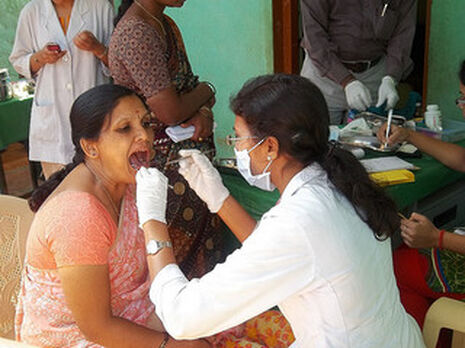Dentists: martyrs of the professional world
Dentistry is one of the most honourable professions there is, says Bret Cameron

Some people see beauty in everything. They are people who have not seen a dental abscess.
Dentistry might not be one of the most romantic professions, but it one of the best paid. Last month, the Independent publicised that the top five NHS dentists earn an average salary of £690,000 per annum. It’s a huge figure but, then again, dentists are the heroes and heroines of the present day. It is well known to archaeologists that dentistry is the principal triumph of the modern age.
Tooth decay afflicted human society as early as c. 13,000 BC, and it became a widespread problem in the wake of the Neolithic Revolution and the rise of (carbohydrate-heavy) agriculture in c. 10,000 BC. From then until the present day, human kind has been plagued by dental difficulties. We were better off foraging for berries. It is only recently (in the last several decades) that death from dental decay has been totally eradicated in the developed world, even though 31% of adults in the UK suffer from the condition.
Nevertheless, the promise of money and hero status combined is not enough to persuade me that dentistry would be a desirable profession to pursue. I brought the astonishing salaries of the top dentists to the attention of my uncle and auntie, who, on hearing this, worried that I might be planning to take up the profession.
I was quick to put them at ease. The jump from medieval literature to dentistry would represent a rather dramatic change of direction and, of course, my bohemian aspirations mean that I do not care for boundless wealth. The most damning indictment of the dentists’ profession, however, came from my auntie: ‘don’t do it’, she warned, ‘because dentists don’t have any good stories to tell’. The profession of dentistry is one so void of anecdotes, she worried, that it would very quickly become mundane. It is to be avoided chiefly because it lacks human drama.
In search of the tacit drama of dentistry, and to prove my auntie otherwise, I came across a webpage entitled ‘Dental Humor and Anecdotes’ written by a certain Dr Collins of the Collins Family Dentistry; it has, alas, done little to alter my preconceptions. Similarly ineffectual in this regard was the Facebook group, Tu sais que tu es assistant(e) dentaire quand… (You know you are a dental assistant when…). It seems, from the contributions to the group, that most of the time you know you are a dental assistant when you are assisting a dentist.
I suppose it all comes down to what you are trying to get out of a profession, or what you are trying to get out of life. Would you rather be a double-agent, whose life is replete with human drama but who is unable to tell anyone any of it, or a dentist? Dentistry is similar to medicine, but with less excitement and less gratitude; it is similar to hair dressing, except the conversation is mostly one way; and it is, like global warming, feared by some, misunderstood by many.
It comes as no surprise that necessity, money and happiness are not co-dependent (at least, not past a certain point). To those interested enough in teeth to spend years of their lives poking around in people’s mouths, thank you. It is a service to society and a service to humanity. But – to the middle class mothers of my school friends who tutted at me for studying medieval literature, a degree which does not lead on to a profession such as medicine, law or dentistry – consider that the virtues of my choice are not in the salary.
 News / Caius mourns its tree-mendous loss23 December 2025
News / Caius mourns its tree-mendous loss23 December 2025 News / Cambridge welcomes UK rejoining the Erasmus scheme20 December 2025
News / Cambridge welcomes UK rejoining the Erasmus scheme20 December 2025 News / CUP announces funding scheme for under-represented academics19 December 2025
News / CUP announces funding scheme for under-represented academics19 December 2025 News / King appoints Peterhouse chaplain to Westminster Abbey22 December 2025
News / King appoints Peterhouse chaplain to Westminster Abbey22 December 2025 Interviews / Politics, your own way: Tilly Middlehurst on speaking out21 December 2025
Interviews / Politics, your own way: Tilly Middlehurst on speaking out21 December 2025








